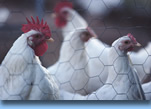| |

Exotic
Newcastle Disease
Home Page

Email
Us
Privacy
Statement
EEO
Statement
USDA | MRP
Return to Home
Page
|
|
YOU CAN PROTECT YOUR BIRDS FROM EXOTIC NEWCASTLE DISEASE — PLEASE
HELP!
Dear Gamefowl Enthusiast:
PLEASE BE AWARE OF
THE DANGERS FACING YOUR BIRDS FROM EXOTIC NEWCASTLE DISEASE (END)! You can
help keep this deadly disease from destroying gamefowl birds. Know the
clinical signs, use safety precautions, and report sick birds to your
appropriate State veterinary officials. This is an animal health
emergency, if you do not cooperate—gamefowl everywhere could be
endangered.
DISEASE DESCRIPTION
END is a
contagious and fatal viral disease affecting all species of birds.
Previously known as velogenic viscerotropic Newcastle disease (VVND), END
is probably one of the most infectious diseases of poultry in the world.
END is so virulent that many birds die without showing any clinical signs.
END can infect and cause death even in vaccinated poultry and causes a
death rate of almost 100 percent in unvaccinated poultry flocks.
END affects the respiratory, nervous, and digestive systems. The
incubation period for the disease ranges from 2 to 15 days. An infected
bird may exhibit the following signs:
• Respiratory: sneezing, gasping for air, nasal discharge, coughing;
• Digestive: greenish, watery diarrhea;
• Nervous: depression,
muscular tremors, drooping wings, twisting of head and neck, circling,
complete paralysis;
• Egg production: partial to complete drop in
production and thin-shelled eggs;
• Appearance: swelling of the
tissues around the eyes and in the neck;
• Mortality: sudden death
and increased death loss in a flock.
END is spread primarily through direct contact between healthy birds
and the bodily discharges of infected birds, which have high
concentrations of the END virus. The disease is transmitted through
infected birds' droppings and secretions from the nose, mouth, and eyes.
END spreads rapidly among birds kept in confinement, such as commercially
raised chickens.
The disease can also be easily spread by
mechanical means. Shoes and clothing can pick up virus-bearing material
and carry it from an infected flock to a healthy one. The disease is often
spread by vaccination and debeaking crews, manure haulers, rendering truck
drivers, feed delivery personnel, poultry buyers, egg service people, and
poultry farm owners and employees.
The END virus can survive for
several weeks in a warm and humid environment on birds' feathers, manure,
and other materials. It can survive indefinitely in frozen material.
However, the virus is destroyed rapidly by dehydration and by the
ultraviolet rays in sunlight.
PET BIRDS
END
is also a threat to the caged–bird industry and poultry hobbyists. Birds
illegally smuggled into the United States are not quarantined and tested
by APHIS and therefore may carry the END virus. Owners of pet birds
should:
Request certification from suppliers that birds are legally
imported or are of U.S. stock, are healthy prior to shipment, and will be
transported in new or thoroughly disinfected containers;
• Maintain records of all sales and shipments of flocks;
•
Isolate all newly purchased birds for at least 30 days;
• Restrict
movement of personnel between new and old birds.
BIOSECURITY AND DISEASE PREVENTION
The only
way to eradicate END from poultry is by rapidly destroying all infected
flocks and imposing strict quarantine and in–depth surveillance programs.
Poultry producers should strengthen biosecurity practices to prevent the
introduction of the disease to their flocks.
Biosecurity is also
important to protect backyard and hobby flocks. The following are tips on
proper biosecurity practices:
• Permit only essential workers and vehicles on the premises.
• Provide clean clothing and disinfection facilities for employees.
• Clean and disinfect vehicles (including tires and undercarriages)
entering and leaving the premises.
• Avoid visiting other poultry
operations.
• Maintain an "all–in, all–out" philosophy of flock
management with a single age flock.
–Control the movement of all poultry and poultry products from farm
to farm.
–Clean and disinfect poultry houses between each lot of
birds.
• Do not keep pet birds on the farm. Do not hire employees who own
pet birds.
I. Protect flocks from wild birds that may try to nest in poultry
houses or feed with domesticated birds.
II. Control movements
associated with the disposal and handling of bird carcasses, litter, and
manure.
III. Take diseased birds to a diagnostic laboratory for
examination.
WHO TO CONTACT
Poultry or pet bird owners or
veterinarians who suspect a bird may have END should immediately contact
State or Federal animal health authorities. For additional information,
you can check out the following Web Site:
http://www.aphis.usda.gov/lpa/issues/enc/exoticnc.html or call the
California END hotline at 1-800-491-1899. To contact the Animal and Plant
Health Inspection Service Veterinary Services' Emergency Program Staff,
call 301-734-8073, 800-940-6524 or email
emoc@usda.gov.
QUARANTINE AREA
As of
February 6, 2003, the Federal quarantine area in California includes
Imperial, Las Angeles, Orange, Riverside, Santa Barbara, San Bernardino,
San Diego, and Ventura counties. In Nevada it includes Clark and the
southern tip of Nye counties; and in Arizona Puma, La Paz, and southern
portions of Mojave (below the Colorado River) counties. You can check the
APHIS Web Site for any updates to the quarantine
areas.
MOVEMENT OF BIRDS
Due to the
presence of END in the Federal quarantine area, no birds, bird products,
and END-exposed materials or means of conveyance will be moved from a
Federal quarantine area without a permit. Risk assessments that assure
that movement will not present a risk of moving the END agent from the
quarantine area are being completed. To inquire about a permit, contact
the California END hotline at 1-800-491-1899. NOTE: If other areas become
affected with END, APHIS will apply the same strategy as is applied within
the current Federal quarantine area. |
|

|